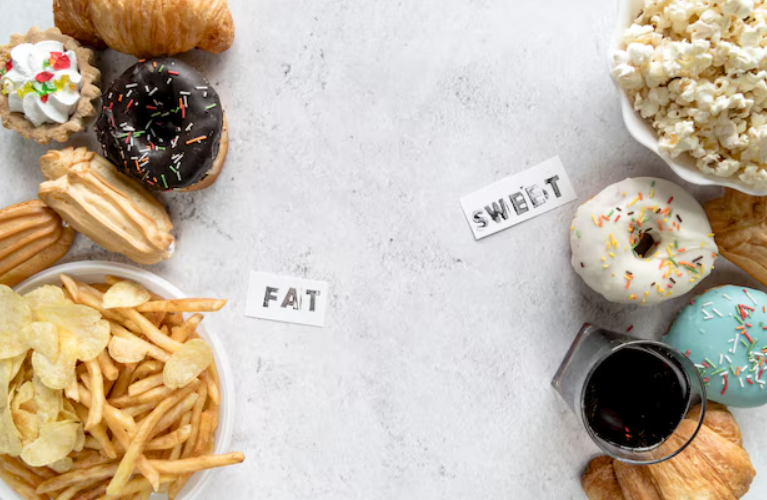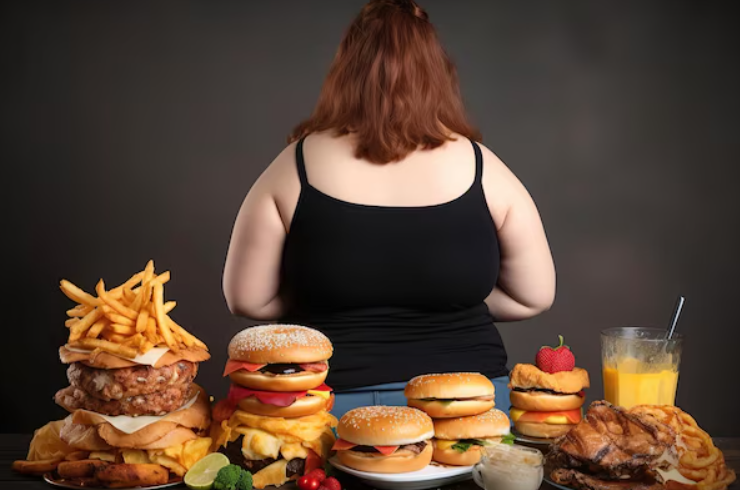Obesity and Its Causes
A number of variables, including as a poor diet, inactivity, and genetic predispositions, contribute to obesity, a complicated health problem. Consuming meals that are poor in vital nutrients and rich in calories, bad fats, and added sugars is one of the biggest causes of weight gain and obesity. Over time, weight gain results from these meals’ disruption of metabolic processes and promotion of fat accumulation in the body. This post will discuss the top 5 foods that cause obesity that you should stay away from, explain how they lead to weight gain, and provide advice on how to make better decisions.
Top 5 Foods That Cause Obesity
1. Sugar-filled Drinks
- One of the biggest offenders when it comes to encouraging weight gain and obesity are sugary beverages, such as sodas, energy drinks, sweetened fruit juices, and even certain iced teas. These drinks have little to no nutritional value and a lot of added sugar.
How They Lead to Obesity
Sugary drinks are a great source of empty calories that leave you feeling hungry. Because your body doesn’t recognise the calories you ingest in liquid form, this causes overeating. Furthermore, eating a lot of sugar causes insulin to rise and causes the body to store more fat. This may eventually lead to the accumulation of visceral fat, or fat around internal organs, which is very detrimental to your health.
Health Hazards of Sugar-filled Drinks
Frequent intake of sugar-filled beverages has been associated with a higher risk of heart disease, fatty liver disease, type 2 diabetes, and obesity. Because they contain a lot of sugar, they may potentially lead to tooth decay.
Better Options for Hydration
Choose water, herbal teas without added sugar, or sparkling water with a little lemon juice. Water may be naturally sweetened by infusing it with fruits like citrus, cucumber, or berries if you’re desiring something sweet.
2. Fried Foods
- Although fried foods like deep-fried snacks, fried chicken, and French fries are wonderful, they are really unhealthy, particularly if you eat a lot of them. These dishes are often deep-fried in oils that contain a lot of saturated or trans fats, which may cause substantial weight gain.
How Fried Foods Lead to Obesity
Fried foods are high in energy density, which means that a tiny portion of them contains a lot of calories. Oil is absorbed during the deep-frying process, which raises the food’s calorie level considerably. Moreover, these fats may interfere with metabolism and are linked to inflammation, which causes the body to store fat.
Health Hazards of Fried Foods
A higher risk of obesity, heart disease, type 2 diabetes, and high cholesterol is associated with frequent intake of fried meals. It is well recognised that trans fats, in particular, cause artery blockages by increasing “bad” LDL cholesterol and decreasing “good” HDL cholesterol.
Healthy Substitutes for Fried Foods
Try air-frying, grilling, baking, or steaming your meal instead of frying it. These techniques maintain the food’s flavour and texture without unnecessarily introducing harmful fats. For instance, grilled veggies or baked sweet potato fries are excellent nutritious substitutes for deep-fried ones.
3. Snacks That Have Been Prepared and Packaged
- Chips, cookies, cakes, crackers, and packaged pastries are examples of processed foods that are often high in artificial additives, harmful fats, and refined sugars. Despite their convenience, these snacks usually lack important elements including fibre, vitamins, and minerals.
How Packaged Snacks Lead to Obesity
Although these meals are abundant in calories, they don’t include enough protein or fibre to keep you feeling full. Because of this, individuals often consume more of them without seeing how it affects their waistlines. Additionally, they often include large amounts of processed carbs and added sugars, which raise blood sugar levels and promote fat accumulation.
Health Hazards of Packaged Snacks
Consuming processed snacks on a regular basis raises the risk of diabetes, heart disease, obesity, and several forms of cancer. Because these foods lack fibre, which is essential for digestive health, they are also linked to poor gut health.
Better Options for Snacks
Whole foods including fruits, vegetables, nuts, and seeds may be used in lieu of processed snacks. Making your own nutritious snacks, such air-popped popcorn, roasted chickpeas, or oat and nut butter energy balls, is another option.
4. Carbohydrate Refinements
- Refined carbohydrates are foods that have had their fibre and vital nutrients removed during processing, such as white bread, white rice, pastries, and other processed grain items. These carbohydrates raise insulin and blood sugar levels quickly, which may result in overeating and the accumulation of fat.
 How Refined Carbs Lead to Obesity
How Refined Carbs Lead to Obesity
Because refined carbohydrates have a high glycaemic index, the bloodstream converts them to sugar very fast. Insulin, a hormone that encourages fat accumulation, rises as a result. Following this increase, cravings for additional refined or sugary foods may arise as blood sugar levels fall, leading to a vicious cycle of overeating and weight gain.
Health Hazards of Refined Carbohydrates
Overconsumption of refined carbohydrates raises the risk of heart disease, metabolic syndrome, type 2 diabetes, and obesity. Additionally, these meals lack fibre, which is crucial for maintaining a healthy digestive system and controlling weight.
Healthy Substitutes for Refined Carbohydrates
Whole grains including quinoa, brown rice, whole wheat, oats, and barley are healthier substitutes. The high fibre content of these grains lowers the risk of overeating by promoting a sensation of fullness and assisting with blood sugar regulation.
5. High-Sugar Desserts and Ice Cream
- Desserts and ice cream are popular indulgences, but when taken in excess, they may contribute to weight gain and obesity since they are often heavy in fat and sugar. The majority of commercially available sweets and ice creams are loaded with artificial additives, excessive fat content, and added sugars, all of which lead to unhealthful weight gain.
How Desserts and Ice Cream Lead to Obesity
Ice cream and other sweet treats are often high in calories from fat and sugar, making it simple to eat too much of them quickly. Additionally, sugary meals cause the “feel-good” hormone dopamine to be released, which might make it more difficult to avoid overindulging in these high-calorie delicacies.
Health Hazards of High-Sugar Desserts
Frequent eating of sugary sweets and ice cream raises the risk of tooth decay, fatty liver disease, insulin resistance, and type 2 diabetes in addition to obesity.
Healthy Substitutes for High-Sugar Desserts
Try creating healthier sweets at home, such fruit sorbet, chia pudding or frozen yoghurt prepared with fresh fruit, as an alternative to sugary treats. Additionally, because natural sweeteners like stevia and maple syrup have lower glycaemic indices than refined sugar, you may consider using them in baking.
In Conclusion: Preventing Obesity through Diet
The secret to keeping a healthy weight and avoiding obesity is to stay away from meals that are heavy in harmful fats, processed sugars, and empty calories. You may lower your risk of obesity and enhance your general health by avoiding sugary drinks, fried meals, processed snacks, refined carbs, and sweet desserts.
Focus on Nutrient-Dense Foods
Rather, concentrate on eating nutrient-dense, entire foods like fruits, vegetables, whole grains, lean meats, and healthy fats. You may maintain a healthy weight, increase your energy levels, and lower your chance of developing chronic obesity-related disorders including heart disease, type 2 diabetes, and certain types of cancer by choosing foods with awareness.
Long-Term Weight Management
Keep in mind that persistence and implementing little, long-lasting dietary adjustments are the keys to long-term weight control. You may start along the road to a better, happier life by avoiding foods that contribute to obesity and making healthier choices.
